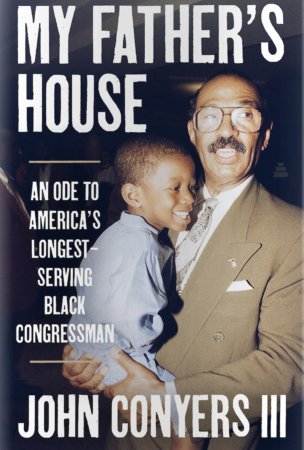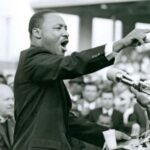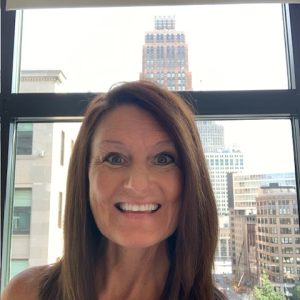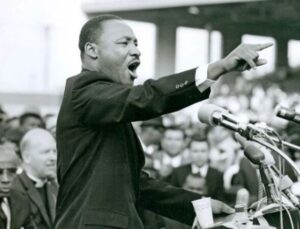John Conyers Jr. served more than 50 years in the U.S. House of Representatives—longer than any Black legislator in American history. He was a founding member of the Congressional Black Caucus, the driving force behind the Martin Luther King Jr. holiday, and the sponsor of the original Medicare for All bill. In My Father’s House, a newly released memoir, John Conyers III reflects not only on his father’s substantial political legacy but also on the unfinished work of justice, identity, and power.
As he prepares to headline the National Press Club in Washington, D.C., this September and appear at the Martha’s Vineyard Book Festival, we spoke with him about legacy, Detroit, and the shifting meaning of political impact.
Q: What inspired you to write My Father’s House?
A: I had no intention of writing a book, but when my dad died it became essential. First, my father had started the book and it needed to be finished, and second, I didn’t want to let what’s happened to so many Black leaders happen to him—have the white media dictate who he was.
I saw how important it was for me to be the first on record to say who John Conyers Jr. was, and not wait. I endeavored to finish the work he started.
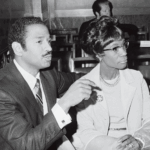
CONGRESSMAN JOHN CONYERS JR. AND CONGRESSWOMAN SHIRLY CHISHOLM – COURTESY JOHN CONYERS III AND BETTMAN ARCHIVE
Q: You’ve said the book isn’t just about legacy—it’s about leadership today. What do you think Detroit’s next generation of leaders needs to understand that the previous generation didn’t face?
A: First, I’m not sure who Detroit’s next generation of leaders are.
The challenge for young people is that Detroit’s old guard of Black leadership tries to dictate who should represent the community—who they think that person should be. Even at the state level, leadership is forcing candidates who clearly aren’t aligned with what the constituency wants.
So the question for young folks is: how do you operate outside the traditional apparatus? How do you find a path that really represents the voices of the people? Even the Democratic establishment doesn’t do a great job of that.
Q: Your father helped establish MLK Day and founded the Congressional Black Caucus. How do you see his influence shaping what’s still unfinished in the fight for justice and equality?
A: I don’t think the CBC today reflects what it was founded on. With a few exceptions, the current iteration is largely in bed with corporate interests that aren’t aligned with Black, brown, or poor people.
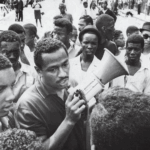
JOHN CONYERS JR. AT 1967 REBELLION – COURTESY JOHN CONYERS III AND BETTMAN ARCHIVE
The problem is that we don’t have multiple Black candidates to ensure true representation. The CBC doesn’t do a good job of helping with that, and it makes it difficult to get candidates who actually speak to the issues we care about.
Q: In a past interview, you spoke about power and principle. What does principled leadership look like in an era of political polarization?
A: It means doing what’s right for people—even when it’s not politically convenient. It’s about refusing to be bought, refusing to be silenced. You can’t say you represent poor and working-class people while you’re serving corporate donors. That contradiction is part of the problem.
Q: Detroit is undergoing a cultural and economic revival—but also grappling with long-standing inequities. How do you reconcile progress with justice, and what role should Black leadership play in that?
A: Black leadership is only important if it’s doing what’s right for people. Identity politics is part of the conversation, but too often, racial representation is used as a substitute for real policies.
The old guard might push a Black candidate for the sake of appearances, but if that candidate isn’t speaking to kitchen table issues that affect Black and brown communities every day, what’s the point?

PRESIDENT BILL CLINTON, CONGRESSMAN JOHN CONYERS JR. AND JOHN CONYERS III- COURTESY JOHN CONYERS III AND BETTMAN ARCHIVE
You have to echo those concerns. Otherwise, you don’t have a case to represent anyone.
Q: Your memoir touches on vulnerability, personal growth, and public pressure. How do those elements shape political identity today, especially for Black leaders?
A: Everybody handles it differently. For someone like me who didn’t just grow up around politics, but in it, it’s more meaningful.
I’ve had articles written about me since I was 15. So I have a different relationship with vulnerability and the public than someone who came to politics later in life. But anyone who chooses to be a public figure has to grapple with it. You can’t separate who you are from the role you play.
Q: Your father served in Congress for over 50 years. In a world that moves faster than ever, is long-term leadership still viable—or has impact changed?
A: It doesn’t have to be different. It’s only different because people are less political in their everyday lives. My father got things done because he had support—from MLK, from Harry Belafonte. They worked in lockstep.
Harry could say things my dad couldn’t. My dad could do things MLK couldn’t. They understood that politics wasn’t separate from culture or economics. That’s not true today. Now, politics feels divorced from everything else.
Q: What would your father say about Detroit in 2025?
A: He loved Detroit. It was home.
Politically, he’d still be talking about jobs, justice, and peace—like he always did. He’d be concerned that for all the development, the median income is still $32,000, and the median rent is half of someone’s paycheck.
What’s happening in Detroit is great for some. But not for everyone. And that’s what he would care about.
Q: Looking ahead, what kind of legacy do you hope to leave?
A: The most important thing is honoring my dad and my grandfather. My grandfather helped start the union. My dad stood for justice.
I want to live a life that doesn’t deviate from that path, but expands it—expands what it means to be a Conyers. I want to make a deep impact, not just politically but economically.
At the end of the day, we all need money, resources, and a real chance to take care of ourselves. My hope is to positively impact the least among us—and create a system where they can thrive, not just survive.
My Father’s House is available wherever books are sold. John Conyers III will headline the National Press Club in Washington, D.C. on September 9 and appear at the Martha’s Vineyard Book Festival this summer.
As always, be sure to subscribe to our newsletter for regular updates on all things Detroit.


